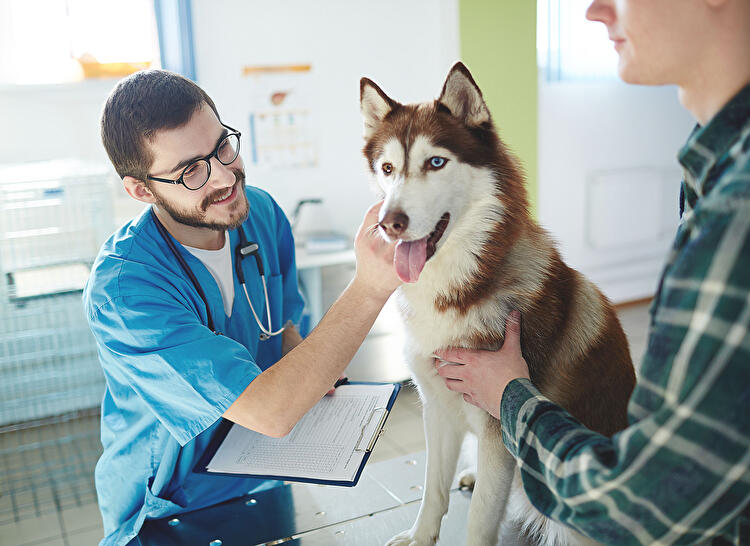
Cool, Hydrated, and In Their Lane: Don’t Let Your Pet Become a Statistic This Summer
Summer is for sunshine and lounging pups. But too much heat can turn the fun into a trip to the vet if dehydration or heatstroke crashes the party.
Our team at Trupanion found that more than 13,000 pets have been treated for dehydration or heatstroke-related claims since 2020.
We also found that traditionally cooler, northern states generally have a higher rate of heat-related claims. Especially during summer, when heat-related claims increase by more than 30%.
Dehydration occurs when the body loses more fluids than it takes in, leading to an insufficient amount of water to carry out normal functions, while heat stroke is when the body loses its ability to control its temperature —often caused or worsened by dehydration, making the two closely connected and very dangerous together in pets.
“Our pets don’t sweat all over their body to cool down like humans do,” says Trupanion Veterinarian Dr. Sarah Nold. “Most breeds lose their heat by panting and through small sweat glands in their paw pads. On hot days, this cooling system can get overwhelmed quite fast, especially if it’s humid which makes panting less effective.”
Key Findings Among Trupanion Pets
- More than 13,000 pets have been affected by dehydration or heatstroke since 2020
- Heatstroke claims have increased by 45% since 2020
- Dehydration claims spike by as much as 364% during summer
Pets and Dehydration
In all, Trupanion has received nearly 12,100 dehydration-related claims since 2020.
Montana, New York and Illinois have the highest rate of dehydration-related claims at around five claims per 10,000 pets.
The number of dehydration claims is also rising. Dehydration-related claims increased by 20% between 2023 and 2024. And in some states, claims spike by as much as 364% during the months of June, July and August.
Below is a look at dehydration-related claims in each state, with a minimum of 50 claims.
| State | Dehydration claims since 2020 | % Summertime change in dehydration claims | Dehydration claims per 10k pets |
|---|---|---|---|
| Arizona | 135 | 74% | 3 |
| California | 2,171 | 49% | 3.3 |
| Colorado | 363 | 35% | 3.5 |
| Connecticut | 210 | 92% | 1.7 |
| Florida | 906 | -12% | 3.2 |
| Georgia | 218 | 3% | 2.4 |
| Hawaii | 60 | -70% | 1.3 |
| Illinois | 369 | 62% | 4.4 |
| Indiana | 131 | 105% | 3.3 |
| Massachusetts | 999 | 43% | 2.2 |
| Maryland | 197 | 108% | 3.1 |
| Michigan | 150 | 94% | 2.2 |
| Minnesota | 124 | 57% | 3.1 |
| Missouri | 75 | 88% | 2.8 |
| Nevada | 135 | -37% | 1.5 |
| New Hampshire | 183 | 104% | 3.5 |
| New Jersey | 610 | 56% | 3 |
| New Mexico | 53 | 0% | 2 |
| New York | 1,078 | 12% | 4.6 |
| North Carolina | 396 | 15% | 2.9 |
| Ohio | 124 | -29% | 1.8 |
| Oregon | 229 | 125% | 2.2 |
| Pennsylvania | 237 | 0% | 2.1 |
| Rhode Island | 84 | 364% | 4.5 |
| South Carolina | 123 | 95% | 2.7 |
| Tennessee | 158 | -38% | 2.5 |
| Texas | 480 | 43% | 3.4 |
| Utah | 56 | 0% | 2.5 |
| Vermont | 50 | 133% | 4.2 |
| Virginia | 392 | -7% | 3.1 |
| Washington | 728 | 27% | 3.4 |
| Wisconsin | 98 | 11% | 3.1 |
Common Signs of Dehydration in Pets
- Dry or sticky gums and tongue (should normally be moist)
- Sunken eyes
- Lethargy or weakness
- Loss of skin elasticity (gently lift the skin on the back of the neck or shoulders – it should snap back quickly, not stay “tented”)
- Excessive panting
- Reduced appetite or refusal to drink
- Dark yellow urine or very little urine
- Collapse or extreme weakness
- Rapid heart rate
- Shock symptoms (cold extremities, pale gums)
Pets and Heatstroke
Heatstroke can sneak up on pets fast. And summer poses a real risk for pets. We found that heatstroke claims peak in July but spike by more than 250% during the summer months.
“Fresh water, shade, avoiding the hottest parts of the day and never leaving pets in cars are some simple steps that can save lives,” says Dr. Nold.
More than 1,000 pets have had heatstroke-related claims since 2020. However, this number is rising. The number of heatstroke-related claims increased by 20% from 2023 to 2024 and by 45% since 2020.
Below is a look at the number of heatstroke-related claims in each state, with a minimum of seven claims.
| State | Heatstroke claims since 2020 | Heatstroke claims per 10k pets |
|---|---|---|
| Arizona | 8 | 0.3 |
| California | 206 | 0.5 |
| Colorado | 22 | 0.1 |
| Connecticut | 16 | 0.3 |
| Florida | 113 | 1 |
| Georgia | 19 | 0.2 |
| Hawaii | 21 | 0.7 |
| Idaho | 9 | 2.8 |
| Illinois | 11 | 0.1 |
| Massachusetts | 65 | 0.4 |
| Maryland | 12 | 0.4 |
| Maine | 7 | 0.4 |
| Michigan | 9 | 0.3 |
| Missouri | 13 | 1.4 |
| Nevada | 51 | 0.5 |
| New Hampshire | 10 | 0.2 |
| New Jersey | 36 | 0.2 |
| New York | 85 | 0.3 |
| North Carolina | 32 | 0.2 |
| Oregon | 22 | 0.1 |
| Pennsylvania | 15 | 0.2 |
| South Carolina | 9 | 0.2 |
| Tennessee | 9 | 0.2 |
| Texas | 62 | 0.6 |
| Virginia | 24 | 0.3 |
| Washington | 59 | 0.3 |
Signs of Heatstroke in Dogs
If you notice any signs of heat stroke in your pet, it’s an emergency. Cool your dog off immediately – move them to the shade, offer them cool (not ice-cold) water, wet their body with lukewarm water, use a fan, and get them to a vet as quickly as possible.
- Excessive, rapid, or noisy panting
- Bright red tongue and gums
- Drooling more than usual
- Restlessness or signs of distress
- Weakness or collapse
- Vomiting or diarrhea (sometimes with blood)
- Rapid heart rate
- Glassy eyes or confusion
- Seizures or loss of consciousness
The Cost & Treatment of Heatstroke and Dehydration
Our data scientists found that while the average heatstroke claim in 2024 was $1,480, but we’ve seen a trip to the vet for this condition cost as much as $65,504.
Mild cases of heatstroke may require IV fluids and oxygen. Severe cases can cause organ damage, brain swelling, clotting problems, or seizures, and may require further treatment and medication to control swelling, stop seizures, treat internal bleeding, or protect the kidneys and other organs.
For dehydration claims, the average was $506, but we've seen as high as $24,393. Subcutaneous fluids (fluids injected under the skin) is the most common treatment for mild dehydration, but for anything more serious, pets are looking at IV fluids and even monitoring electrolyte levels and organ function because in severe cases, the kidneys, heart, brain and liver are all at risk.
About truInsights
The data presented in this report is part of Trupanion’s truInsights initiative. truInsights is a data focused initiative introduced by Trupanion and designed to deliver valuable health-related data and insights to pet parents, veterinarians and pet lovers alike. With over 20 years of pet health data, Trupanion has explored its veterinary invoice data from more than two million pets and provides details on data trends, as well as prevention tips for keeping our pets safe.
About Trupanion
Trupanion is a leader in medical insurance for cats and dogs throughout the United States, Canada, and certain countries in Continental Europe with over 1,000,000 pets currently enrolled. For over two decades, Trupanion has given pet owners peace of mind so they can focus on their pet's recovery, not financial stress. Trupanion is committed to providing pet parents with the highest value in pet medical insurance with unlimited payouts for the life of their pets. With its patented process, Trupanion is the only North American provider with the technology to pay veterinarians directly in seconds at the time of checkout. Trupanion is listed on NASDAQ under the symbol "TRUP". The company was founded in 2000 and is headquartered in Seattle, WA. Trupanion policies are issued, in the United States, by its wholly owned insurance entity American Pet Insurance Company and, in Canada, by Accelerant Insurance Company of Canada or GPIC Insurance Company. Policies are sold and administered in Canada by Canada Pet Health Insurance Services, Inc. dba Trupanion 309-1277 Lynn Valley Road, North Vancouver, BC V7J 0A2 and in the United States by Trupanion Managers USA, Inc. (CA license No. 0G22803, NPN 9588590). Canada Pet Health Insurance Services, Inc. is a registered damage insurance agency and claims adjuster in Quebec #603927. For more information, please visit trupanion.com.
Methodology
Trupanion looked at the number of heatstroke and dehydration-related claims from January 1, 2020 to December 31, 2024.
Source: Trupanion, Inc.


